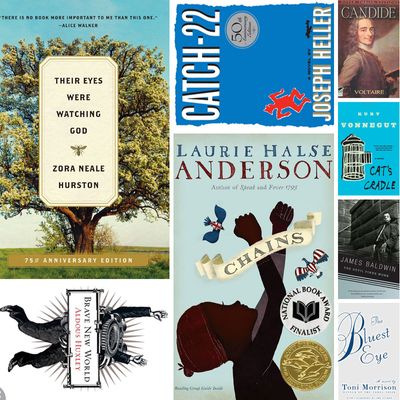
Bookseller One Grand Books has asked literary celebrities to name the ten titles they’d take to a desert island, and they’ve shared the results with Vulture. Below is Black-ish star Yara Shahidi’s list.
The Bluest Eye, by Toni Morrison
Still one of the only books that has left me in tears. Morrison’s words vividly depict how societal pressures and stereotypes become internalized, emphasizing the importance of self-love through a story of self-hate.
Cat’s Cradle, by Kurt Vonnegut
Cat’s Cradle is a perfectly satirical novel poking fun at the arbitrary systems, institutions, and rules that hold society hostage, in a way that only Vonnegut could. It is easy to get lost in the fantastical island of San Lorenzo and its religion of Bokononism. A story with an even more fantastical backstory.
Brave New World, by Aldous Huxley
Infamous for the predictions made about the modern world, Huxley’s Brave New World gives chilling commentary on the flaws of both the present and future societies that we are and will be living in. At the epicenter, it is an age-old debate about the dichotomy of freedom and happiness.
Their Eyes Were Watching God, by Zora Neale Hurston
Everything about this novel is poetic. From the ripe symbolism and haunting telling of true love, to witnessing the true liberation of a woman who has led a life dictated by societal pressures. The story of Janie is both insanely specific to her life and also a statement on the universal transformative stages of womanhood.
The Devil Finds Work, by James Baldwin
This list could easily have been comprised of all of Baldwin’s works. The Devil Finds Work is extremely relevant writing, informing society on the issues of diversity and representation in media. Through a series of essays, Baldwin discusses the significance of actors Harry Belafonte and Sidney Poitier and others, all mainstream entertainers and pivotal members of the civil-rights movement. Their on- and offscreen lives became political statements around the racial landscape of America. Baldwin recognizes the double-edged sword of media: a celebration and suppression of the Black community.
The Odyssey, by Homer
The Odyssey was first book I read with my Grampie at 4 years old and was my introduction to the mesmerizing tales of Roman and Greek mythology. Not only is this book a classic, with plenty of recognizable tales, but truly a whimsical experience of triumph, love, and hardship.
Chains, by Laurie Halse Anderson
Chains was my introduction into the world of historical fiction, and oh what a lovely introduction it was. Laurie Halse Anderson writes about the unbreakable bond of love between two sisters, a love that carried them through the hardships of slavery, to fight for the freedom of both themselves and America.
Candide, by Voltaire
Probably the best example of Murphy’s Law, Voltaire is an iconic writer from the era of Enlightenment, whose work speaks to the shifting of morals, ethics, and policies during the 18th century. A wonderful complementary reading to my AP European History class.
Bud, Not Buddy, by Christopher Paul Curtis
Bud, Not Buddy should be mandatory reading. The story of an orphan determined to find his father weaves in and out of an accurate illustration of life during the Great Depression. A feel-good tale that beautifully and painfully describes the determination of a young black boy.
Catch-22, by Joseph Heller
Oh, how beautifully confusing this novel is. Heller, a war veteran himself, creates a cast full of colorful characters and antagonists to illustrate the insane bureaucracy of the war machine. A perfect compatriot to Slaughterhouse-Five, revealing that we all may have a little Yossarian and Billy Pilgrim in our personalities.

